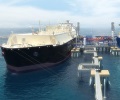LNG market participants see subdued US FOB selling interest for prompt cargoes

High spot LNG prices and the ongoing outage at Freeport LNG have subdued US FOB selling interest for prompt cargoes and shifted the priority in shipping to long-term fixtures as market participants wait for more favorable conditions to trade, an analysis by S&P Global Commodity Insights shows.
Market participants see the potential down the curve for arbitrage opportunities to open up and push some cargoes to the Far East instead of Europe, which has seen much of the demand for US volumes in recent months amid supply concerns due to Russia’s invasion of Ukraine.
Day rates for TFDEs ship are bottoming, last assessed at $45,000/d and $50,000/d in the Atlantic and Pacific basins, respectively. Shipowners and traders are hedging their risk against the uncertainty in the spot market. Period fixtures range from multi-year fixtures to month on month fixtures. Shell’s Sevilla Knutsen ship was heard relet for an eight-month period at $120,000/d and BP has the Diamond Gas Crystal fixed for seven months at $147,000/d.
“People are long shipping post Freeport,” said an Atlantic-based trader, adding that liquidity for prompt FOB cargoes was thin.
A major LNG producer and trader was said to currently not be selling anything FOB on the short-term, according to a market source. A second source said July 21 that on FOB there were at least two parties selling mid-term strips.
The Platts Gulf Coast Marker for US FOB cargoes loading 30-60 days forward was assessed at $36.50/MMBtu July 21, up $2.45/MMBtu on the day and three times higher than a year ago.
Freeport LNG, which has been offline since a June 8 explosion and fire, accounts for around 15% of of LNG processing capacity in the US. Major buyers of its volumes include Japan’s Jera and Osaka Gas, South Korea’s SK Gas Trading and France’s TotalEnergies. Freeport LNG currently hopes to resume partial service in early October and full service by the end of the year. Small feedgas volumes that it was observed drawing July 21 were not related to LNG operations. A spokeswoman said the gas was being used for power production to support the Texas grid, which was strained by extremely high temperatures in the state.
LNG cargo ships, meanwhile, are reverting to burning conventional oil-based bunkers instead of LNG in order to minimize shipping costs. This is an unconventional pattern that was seen at the beginning of the pandemic and is a position taken in the market when LNG prices are high. One India-based trader said that was likely to continue in the near-term.
Some LNG traders note that the fundamentals could soon shift, with inter-basin spreads narrowing and indications based on recent tenders that Asia will be buying in the months ahead. Platts DES Northwest Europe, the delivered price of LNG into Northwest Europe, was assessed at $38.233/MMBtu July 21, while the Platts JKM, the benchmark for spot-traded LNG delivered to Northeast Asia, was assessed at $37.867/MMBtu.
“Japan, Taiwan, and South Korea. Thailand awarded. Supply issues in the Far East as well,” said a Europe-based trader. “India awarded. Turkey buying actively. Latam and other Med buyers buying.”
Source: Platts

 Hellenic Shipping News Worldwide Hellenic Shipping News Worldwide, Online Daily Newspaper on Hellenic and International Shipping
Hellenic Shipping News Worldwide Hellenic Shipping News Worldwide, Online Daily Newspaper on Hellenic and International Shipping





















 PG-Software
PG-Software